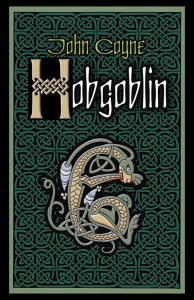
John Coyne
Dover Publications
November 18, 2015
Reviewed by Marvin P. Vernon
A little historical perspective is needed to review Hobgoblin properly. Hobgoblin, which was written by established horror and supernatural writer John Coyne, was first published in 1981 as was a similar novel titled Mazes and Monsters by Rona Jaffe. What both novels have in common is that they were about the rising interest in fantasy role playing games like Dungeons & Dragons. The other thing they had in common was a concern that these games may be harmful for troubled or neurotic teens who became obsessed with them. Mazes and Monsters was the more commercially successful of the two books, being loosely based on a true incident and becoming a popular TV movie. Whether you agree or disagree with the premise that fantasy role playing games can be harmful, it did an adequate job in presenting its case.
Then we have Hobgoblin. Here is the same idea: a neurotic but intelligent teenager is appearing to blur the line between fantasy and reality. But author John Coyne takes a different tactic – his premise is purely fictional. His main protagonist is Scott Gardiner, a teenager who is obsessed with a role-playing game called Hobgoblin which is based on Irish legends. His go-to character is Brian Boru, a high level fighter who never gets killed. One night Scott’s character finally meets his match…at the very same time Scott’s father dies of a heart attack. Scott and his mother moves to a medieval styled castle, on the banks of the Hudson River no less, where she works as an archivist where Scott continues to play the game alone. That’s when things begin to happen around the castle that makes him question how much is real and how much is imaginary.
Does the woods around the castle hold legendary creatures or is Scott not-so-slowly losing his grip on reality? That is the question the author is teasing in this messy and badly structured novel. Eventually the real question becomes: do we care? One downfall is that Scott is not very likeable – he is immature, selfish and basically a brat. We are supposed to feel sorry for him due to the loss of his father but there is no foundation set to feel that loss. There is also a problem of an endless amount of coincidences and unbelievable circumstances. The idea of Scott’s character and his father dying as the exact same time is far-fetched enough, yet Coyne builds one unbelievable circumstance upon another with no real warning as if hoping the reader doesn’t notice he has gone into the silly zone.
Finally (and for me the most unforgivable issue) is that the entire book is a cheat. It suggests and promises some kind of tie-in with role-playing and Scott’s real or imagined events. Instead of combining the two, we get a jumbled mess that never really brings them together intelligently. The made-up game itself doesn’t really fit any realistic structure of any role-playing game I’ve ever experienced. Even worse, Coyne milks the possible supernatural elements to the point that there is no real pay-off once we get to the Scooby-Doo ending. It is trite. It is predictable. It is disappointing, especially since we have a character that doesn’t really seem to grow up in any sense.
At least Jaffe’s Mazes and Monsters addressed a real issue: are role-playing games harmful to more vulnerable teens? Coyne acts like he wants to address this too, yet chooses to stay on the fence by making it some kind of horror/suspense tale at the same time. In trying to play both sides, he fails. Hobgoblin will likely disappoint most readers because it tries to be both and ends up being nothing.
- Slices – Book Review - September 27, 2017
- A Debt to be Paid – Book Review - September 26, 2017
- The Darklights – Book Review - September 21, 2017
- Pacific Rising – Book Review - July 28, 2017
- Palladium at Night – Book Review - July 17, 2017
- Apartment 14F – Book Review - May 31, 2017
- Final Girls – Book Review - May 26, 2017
- Creepshow – Book Review - May 8, 2017
- Exorcist Falls – Book Review - April 10, 2017
- The Wild Harmonic – Book Review - March 20, 2017


